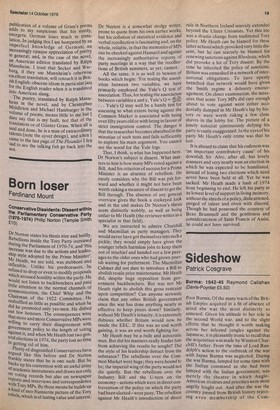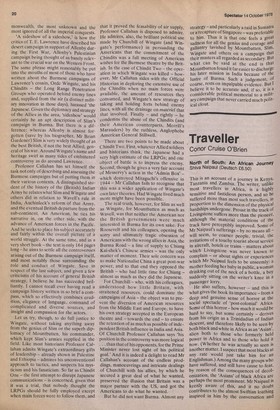Sideshow
Patrick Cosgrave
Burma: 1942-45 Raymond Callahan (Davis-Poynter 0.50) Poor Burma. Of the many tracts of the British Empire acquired in a fit of absence of mind she was the most distinctly so annexed. Given his attitude to her role in the second World war, and to the slight efforts that he thought it worth making across her infested jungles against the Japanese, it is pleasantly ironic to recall that the acquisition was made by Winston Churchill's father. From the time of Lord Randolph's action to the outbreak of the war with Japan Burma was neglected. During the war Burma, lumped for some time with the Indian command as she had been lumped with the Indian government, was merely the theatre in which AngloAmerican rivalries and priorities were most angrily fought out. And after the war the country passed from British history rejecting even membership of the Corn monwealth, the most unknown and the most ignored of all the imperial conquests. 'A sideshow of a sideshow,' is how the critics of T. E. Lawrence have described his desert campaign in support of Allenby during the First War, Allenby's Palestinian campaign being thought of as barely relevant to the crucial war on the Western Front. The same phrase might reasonably be put into the mouths of most of those who have written about the Burmese campaigns of Lawrence's cousin, Orde Wingate, and his Chindits — the Long Range Penetration Groups who operated behind enemy lines and, supplied from the air (a distinct military innovation in those days), harassed 'the Japanese. Given the diplomacy and strategy of the Allies in the area, 'sideshow' would certainly be an apt description of Slim's campaign in Burma. But there is a difference: whereas Allenby is almost forgotten (save by his biographer, Mr Brian Gardener) Slim is very widely thought of as the best British, if not the best Allied, general of his war. Around Wingate's name and heritage swirl as many tides of embittered controversy as do around Lawrence.
Professor Callahan has set himself the task not only of describing and assessing the Burmese campaigns but of putting them in their various contexts. A distinguished student of the history of the (British) Indian Army he relates what Slim and Wingate and others did in relation to Wavell's rule in India, Auchinleck's reform of that Army, and the eventual British departure from the sub-continent. An American, he ties his narrative in, on the other side, with the advance of American forces in the Pacific. And he seeks to place his subject accurately and fairly within the overall picture of a world struggle. At the same time, and in a very short book the text is only 164 pages long — he aims to settle all the controversies arising out of the Burmese campaign itself, and most notably those surrounding the role and conduct of Wingate. Save in respect of the last subject, and given a few criticisms of his account of general British strategy, I believe he has succeeded brilliantly. I cannot recall ever having read a campaign history written in so brief a compass, which so effectively combines erudition, elegance of language, command of complicated and diverse sources, and insight and compassion for the actors.
Let us try, though, to do full justice to Wingate, without taking anything away from the genius of Slim or the superb diplomacy of Mountbatten, his commander, which kept Slim's armies supplied in the field. Like most historians Professor Callahan admits Wingate's extraordinary gifts of leadership — already shown in Palestine and Ethiopia — admires his unconventional approach to tactics, and suspects his mysticism and his fanaticism. So far as Chindit One — the first attempt to disrupt Japanese communications — is concerned, given that it was a trial, that nobody thought the LRPGs should be fully employed except when main forces were to follow them, and that it proved the feasability of air supply, Professor Callahan is disposed to admire. He admires, also, the brilliant political use made by Churchill of Wingate (and Wingate's performance) in persuading the Americans that the commitment of the Chindits was a full meeting of American wishes for the Burmese theatre by the British. In the case of Chindit Two — the operation in which Wingate was killed — however, Mr Callahan sides with the Official Historian in deploring the extensive use of the Chindits when no main forces were available, the amount of resources they consumed, and Wingate's new strategy of taking and holding forts behind enemy lines, with all the drainage on materiel that that involved. Finally — and rightly — he condemns the abuse of the Chindits (and their American counterparts, Merrill's Marauders) by the ruthless, Anglophobe American General Stillwell.
There are two points to be made about Chindit Two. First, whatever Allied soldiers and historians think, the Japanese had a very high estimate of the LRPGs; and one object of battle is to impress the enemy. Second, though he gives a very fair account of Messervy's action in the `Admin Box' — which destroyed Mitaguchi's offensive in 1944 — Mr Callahan fails to recognise that this was a wider application of Wingate's own later theories. Had Wingate lived much more might have been possible.
The real truth, however, for Slim as well as Wingate, for Mountbatten as much as Wavell, was that neither the American nor the British governments were much interested in Burma for its own sake. For Roosevelt and his colleagues, opening the sorry and ultimately tragic obsession of Americans with the wrong allies in Asia, the Burma Road — a line of supply to Chiang Kai-shek's Chinese armies — was the only matter of moment. Their sole concern was to make Nationalist China a great post-war power, and to that end they opposed the British — who had little time for Chiang — almost as much as they did the Japanese. For Churchill — who, with his colleagues, understood how little Britain, with straitened resources, could dominate the campaigns of Asia — the object was to prevent the diversion of American resources from the Middle East and Europe, to have his own strategy accepted in the European theatre and — towards the end — to ensure the retention of as much as possible of independent British influence in India and Asia. Of Churchill Professor Callahan says 'his position in the controversy was more logical . . . than that of his opponents, for the Prime Minister never lost sight of his political goal.' And it is indeed a delight to read Mr Callahan's account of the endless proddings, manoeuvrings and intricate dealings of Churchill with his allies, by which he secured a great deal of what he wanted, preserved the illusion that Britain was a major partner with the US, and got the Americans to do what he wanted.
But he did not want Burma. Almost any strategy —and particularly a raid in Sumatra or a recapture of Singapore — was preferable to him. Thus it is that one feels a great sadness for all the genius and courage and gallantry lavished by Mountbatten, Slim, wingate and others on a campaign that their masters all regarded as secondary. But what can be said at the end is that Mountbatten found it far easier to discharge his later mission in India because of the lustre of Burma. Such a judgement, of course, rests on impalpable evidence. But I believe it to be accurate and, if so, it is a considerable political memorial to a military campaign that never carried much political clout.



































 Previous page
Previous page